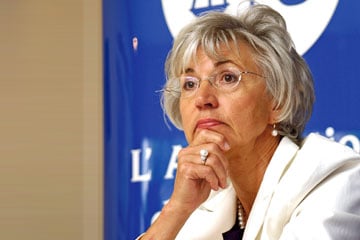In one of the first criminal law cases to be heard at the Supreme Court of Canada after Beverley McLachlin was named its chief justice in January 2000, she wrote the dissenting judgment.

In one of the first criminal law cases to be heard at the Supreme Court of Canada after Beverley McLachlin was named its chief justice in January 2000, she wrote the dissenting judgment.
The central issue in R. v. D.D. was when expert evidence is admissible on why a child did not immediately report an allegation of sexual abuse. For the majority, the answer was simple. An instruction to the jury that any delay in disclosure “signifies nothing” would suffice. An exclusionary rule was not the best approach argued McLachlin in her dissent.
Children may delay disclosure of abuse for a variety of reasons and if an expert meets the legal test for admissibility, then this context could be helpful for a jury.
“We cannot say as a general rule that expert evidence on a child’s delay in reporting sexual assault is always admissible. Nor can we say it is never admissible,” she wrote. The dissent highlighted two recurring aspects of her approach to criminal law issues that came before the Supreme Court. There was a focus on ensuring that the rights of vulnerable participants in the justice system were protected and always trying to find the proper balance between competing interests in criminal law cases. Her retirement on Dec. 15 comes after nearly three decades on the Supreme Court and almost 18 years as its chief justice — the longest tenure of any chief justice in the court’s history.
Nader Hasan, a partner at Stockwoods LLP in Toronto and a former clerk at the Supreme Court, says that the administrative skills of McLachlin as chief justice are another aspect of her impact on the court. “Her enormous legacy will be due in part to the fact the institutional reputation of the court is as high as ever,” says Hasan.
In the criminal law field, the court during her tenure as chief justice issued a number of decisions that strengthened protections for sexual assault complainants, for example. Yet, it was also often more deferential to police powers over the Charter rights of the individual accused.
“The pendulum has arguably swung back in favour of law enforcement. Chief Justice McLachlin was at the centre of an increasingly conservative court,” says Hasan, who specializes in criminal and constitutional law.
Jamie Cameron, a criminal and constitutional law professor at Osgoode Hall Law School, says that it is not easy to “pinpoint” McLachlin in terms of her criminal law philosophy. “That is for a particular reason. She has consistently described herself as a judge who takes each case on its own terms. It has produced a mixed jurisprudence. It is pragmatic and versatile,” Cameron suggests.
The judgments authored by McLachlin usually have a “careful sensibility, working both sides to find the appropriate equilibrium,” says Cameron. One of the few instances where there was a more “absolute approach” was in the 2011 judgment in R. v. J.A., on the issue of whether an individual can consent in advance to have sexual acts performed on them by a partner, when he or she is unconscious. Writing for the majority, the concept of “advance consent” was rejected by McLachlin. “An individual must be conscious throughout the sexual activity in order to provide the requisite consent,” she wrote. While the existing “rape shield” law provisions were struck down in a 1991 decision written by McLachlin in R. v. Seaboyer, her judgment also included many suggestions to fix the law which were adopted by the federal government and upheld in a subsequent Supreme Court decision.
Five years ago in a decision that upheld changes to the Canada Evidence Act to make it easier for the testimony of adults with mental disabilities to be admitted in court, sexual assault was described bluntly as an “evil” in the first line of McLachlin’s judgment in R. v. D.A.I.
“The challenge for the law is to permit the truth to be told, while protecting the right of the accused to a fair trial and guarding against wrongful conviction,” she added.
Nicholas Bala, a law professor at Queen’s University whose work in this area was cited by the Supreme Court, described the decision as striking the right balance between the needs of witnesses and the rights of an accused. A child or an adult with a mental disability can still testify accurately without understanding abstract inquiries about the obligation to tell the truth, he notes.
“This is an access to justice issue,” says Bala. In some areas of the criminal law, such as whether statements to police while in custody are voluntary or the right to silence, there may now be more constitutional protections in the United States, suggests Hasan. “There has been an erosion of the right to self-incrimination,” he says. The decision in R. v. Grant that the Chief Justice co-authored with Justice Louise Charron in 2009 has brought about a significant change in dealing with evidence obtained through a breach of the Charter.
“Under early Charter jurisprudence, we had a modified exclusionary rule. Now we have a modified inclusionary rule,” Hasan says. However, he has praise for the way the court has struck down mandatory minimum sentencing provisions, beginning with its 2015 decision R. v. Nur which McLachlin wrote. “Nur may turn out to be one of the most important s. 12 (of the Charter) cases, the court has ever decided,” says Hasan.








